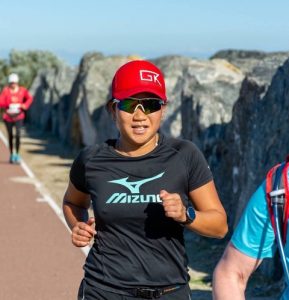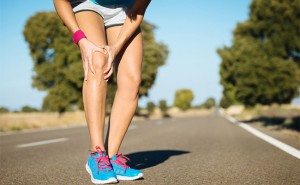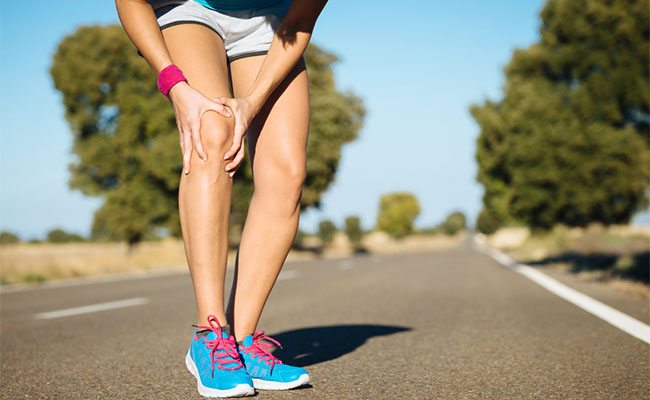Are you afraid running will wear out your knees?

Ruth Chang running during a triathlon
Ruth Chang is a senior musculoskeletal physiotherapist and keen runner and triathlete. Ruth works with clients ranging from high level athletes to people in pain who are just trying to get moving again. She is passionate about helping people to understand the evidence as well as dispelling the many myths associated with exercise and osteoarthritis. Ruth has presented for Triathlon WA on the subject and is available at Star Physio in West Perth on Tuesdays and Thursdays. Click here to make an appointment with Ruth or one of our other expert staff.
Triathlon and running
Triathlon is a unique sport in that it encompasses three disciplines. Injuries may occur as a result of an individual leg, or as a result of a combination of all three. Overuse-related injuries are prevalent in triathlon, and research has shown the lower leg, usually from running, produces the most injuries1.
Many clients seek advice when they get pain related to exercise but unfortunately, most are told to stop exercising, in particular running, for fear of causing more damage or wear and tear.
But wait…. Won’t running cause wear and tear? Your knees will become ‘bone on bone’!
 People are often shocked to be told they have knee osteoarthritis (OA). This is a condition that describes general wear and tear in a joint. It affects the whole joint including bone, cartilage, ligaments and muscles. X-rays commonly reveal age related changes in these areas of your knee, but these changes often don’t correlate directly with pain or loss of function. Sometimes people with OA are mistakenly told to stop exercise, often by so-called experts who have not kept up with current evidence and information.
People are often shocked to be told they have knee osteoarthritis (OA). This is a condition that describes general wear and tear in a joint. It affects the whole joint including bone, cartilage, ligaments and muscles. X-rays commonly reveal age related changes in these areas of your knee, but these changes often don’t correlate directly with pain or loss of function. Sometimes people with OA are mistakenly told to stop exercise, often by so-called experts who have not kept up with current evidence and information.
So, will running wear your knees out?
Recreational runners are shown to have less OA changes in their knees than sedentary people2. Recent research by Miller3 confirms that joint loading in runners does not initiate knee OA.
The regular loading and unloading of the knee we experience in running conditions the joint, making it stronger. The repetitive bending and straightening of the knee may help circulate fluid, providing lubrication and nourishment to the surrounding tissue. Together these factors actually protect our knees!
So no, running wont wear out your knee, in fact if progressed gradually, it is more likely to assist your knees!
Knee pain and running
If you experience some knee pain following running, it’s important to determine what may have caused this. Ensure you training program has structure that includes appropriate increases in volume, with enough rest and recovery. If you’ve had previous injuries, make sure you’ve had these reviewed by experts like the Star Physio Team so that you can make a full recovery before embarking on your triathlon or running journey!
Often previous injuries or pain make people stop exercising which leads to loss of fitness and strength, as well as fear of movement due to previous pain. Ensure any strength deficits are addressed with a program designed by an expert who understands both the injury, but also appropriate exercise and strength programs.
The most common causes of failed exercise programs are
- incorrect entry point – starting too hard causing more pain
- inappropriate load – to get strong and resilient, you need to progress to heavier loads
- lack of progression – doing the same exercise without progressing the weight or load stalls the process
With the right program, supervised by the appropriate health professional, it is amazing what can be achieved!
Do I Need Surgery?
If you’ve already spoken to a GP or Surgeon who says surgery such as a total knee replacement is required, it is still worth considering an exercise program. Appropriate strengthening and weight management can delay surgery at least two years, or result in twice the improvement in pain and function following surgery4 and occasionally stops the need for surgery altogether!
If you have been told that your have osteoarthritis, or have sore hips and knees that are slowing you down and stopping you from doing the things you love, get in touch with the experts at Star Physio and start your journey back to health and fitness today!
Call 92124254, follow the link on this page or book online now here!
References
1(Clinical Chiropractic., Vol 9 pp 129-138).
2(J Orthop Sports Phys Ther., Vol 47, No 6 pp373-390 2017).
3(Exerc. Sport Sci Rev., Vol 45, No 2 pp 87-95 2017).
4(Osteoarthritis and Cartilage., Vol 26 pp1170-1180 2018).

Tara West knows Best – the truth about muscle soreness
We all know the feeling. You just smashed a really hard workout, you increased your weights in the gym, or you returned to volleyball training after taking the Summer off. You feel great – until you wake up the next morning, and you can barely move! Delayed onset...
Tara West Knows Best – the Side Plank with Isometric Clam
I love this exercise. Not only does it work the obliques (which are important for generating power with spiking and serving), but it also strengthens the shoulders, back and glutes too. Being strong through these muscle groups will not only help to reduce the risk of...
Tara West Knows Best – Volleyball Injuries
Studies have shown that volleyball players are at risk of a broad range of injuries with ankle sprains being the most common, accounting for up to half of all volleyball related injuries. Whilst often considered mild when compared with other injuries, ankle sprains...
Tara West Knows Best
Last week I had the privilege of visiting Rossmoyne High School (my old stomping grounds), where I spoke to the year 9s and 10s about the upcoming Australian Volleyball Schools Cup, and how to get the most out of their bodies during the week. We discussed recovery...

